This week’s Monday Roundup is sponsored by Treo Bike Tours of Eastern Oregon. Now is the time to grab your crew and plan your trip! Treo offers multi-day all-inclusive packages and they’ll even pick you up from Portland.
Welcome to Monday. Was that a great weekend or what? I hope you were able to enjoy the warm sunny weather. Now it’s time to put our thinking caps on once again.
On that note, here are the best stories we came across in the past seven days…
Grit girls: Much to love about this NY Times piece on the appeal of mountain bike racing to young girls and the organization that’s bringing the races to high schools nationwide.
Coal rollers guilty! A Utah judge ruled against “Diesel Bros” for EPA violations related to their sale of equipment that allows people to “roll coal”. (We wrote about this lawsuit back in 2016.)
Click and Clack: Legendary co-host of NPR’s Car Talk joined Doug, Sarah and Aaron on the latest War on Cars Podcast episode.
Too many cars: This must-read National Geographic piece (worth giving them your email for) delves into the challenges facing cities and comes to one major theme: To survive and thrive in the future we must undo our history of car-centric planning.
Mobility and climate: And a similar tone from CityLab about the urgency to address climate change and how urban transportation can and should play a major role.
Reactionary progress in SF: Mixed feelings when a city gets aggressive with bike safety fixes only after a high-profile death.
Flip ’em off: In a victory for frustrated road users everywhere, a federal court ruled that holding up your middle finger is a constitutional right.
Advertisement
Helmet conversation evolves: The success of shared electric scooters in Spokane, Washington has that city seriously considering a change to helmet laws to make them optional for riders.
Think airplanes are dangerous? Excellent piece in Slate about how automakers’ rush to sell high-tech cars is making our roads significantly less safe as drivers lose ability to think for themselves and put too much trust into their cars.
Why people oppose bike lanes: This wonderful Streetfilms from the National Bike Summit features bike advocacy pros sharing the most ridiculous excuses they’ve heard for not building bike lanes.
Words matter: The Gothamist does a great job explaining how biased and apathetic police work and insensitive police statements re-traumatize victims of traffic crashes.
Tweet of the Week: (Ms. Sadik-Khan is the former NYC DOT Commish and a globally recognized urban planning consultant.)
Once king of sustainable transpo, Portland could become jester with a $500M interstate expansion. Not sure what’s more galling—the state thinking it can widen a road w/o increasing traffic, or thinking it can convince Portlanders it’s good for the planet https://t.co/8SaDWIlOPy
— Janette Sadik-Khan (@JSadikKhan) March 15, 2019
— Jonathan Maus: (503) 706-8804, @jonathan_maus on Twitter and jonathan@bikeportland.org
Never miss a story. Sign-up for the daily BP Headlines email.
BikePortland needs your support.

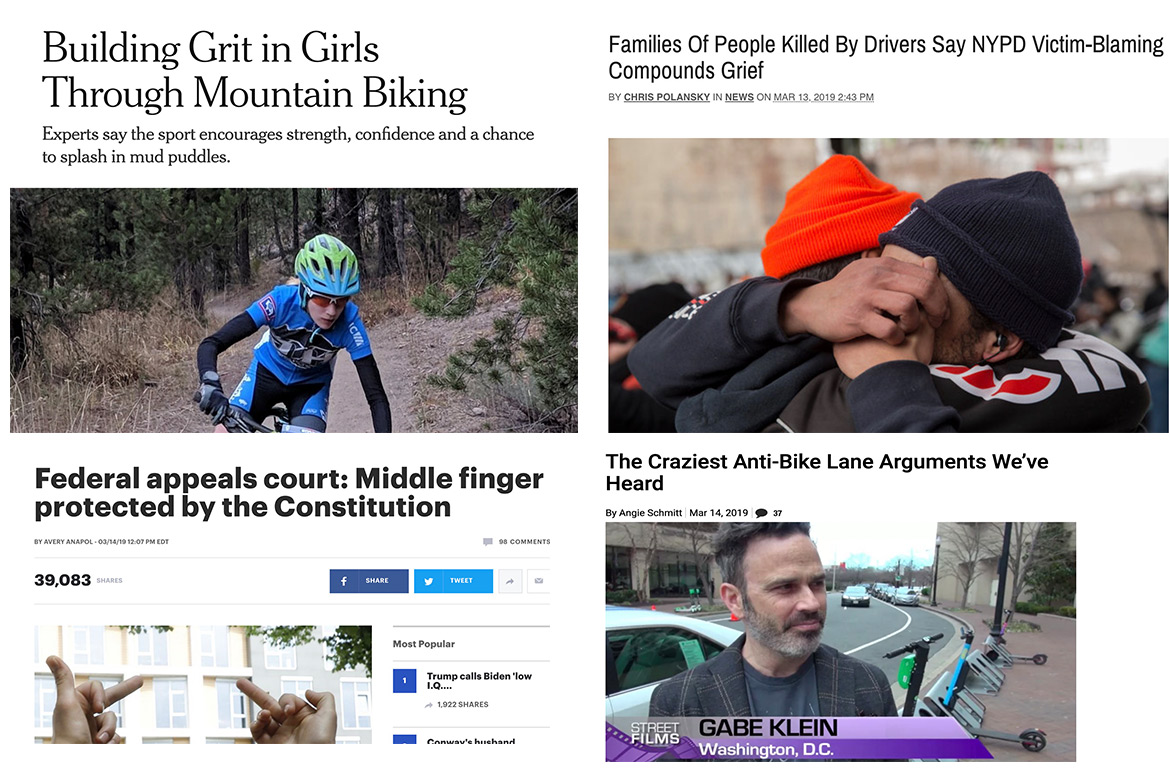
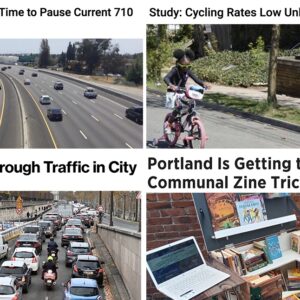
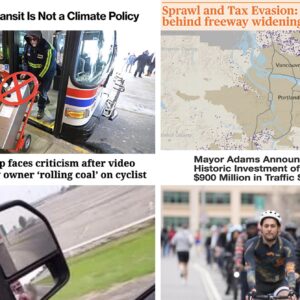
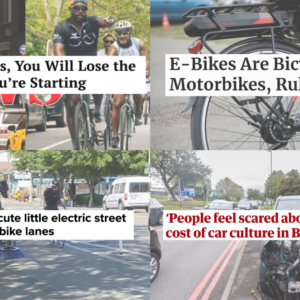
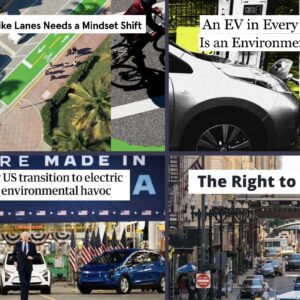
The Slate article was interesting. We are in the middle of the safest flying environment ever as pilot decisions have generally replaced by computerized decisions that don’t let the pilots make the bad decisions that they used to make which caused crashes. All the automated braking and lane keeping automation are great additions to cars. If regulators were to make automated braking that detected pedestrians and bikes required for new vehicles I bet we would see much safer streets. Add in some speed control and we might be 75% of the way to vision zero.
That’s probably true, but I think it may be at the cost of mobility for everyone except people in cars. In the article below, Chuck Marohn points out that once cars absolutely have to stop for people outside cars, people outside cars would likely be further excluded from the street environment in the name of efficiency:
https://www.strongtowns.org/journal/2018/4/2/automated-vehicles-xwkj3
Indeed, this.
I have a vague fear this will become more of a central issue if advocates attempt to reframe bicycle travel and bicycles as fundamentally different from car travel/cars. Take any crack at dismantling “same roads, same rights, same rules”—which is already fundamentally bogus—and watch motoring advocates declare that if you don’t want the “same rules”, then don’t expect to keep access to the same roads either. Different angle, same goal: reserve roads exclusively for motorists.
I am not sure I buy the argument that automated vehicles would create a situation where people would be excluded from using the street. I agree that AV’s that always stop for humans will fundamentally change the nature of the car human interaction on the street. But it seems as though we are stuck on a long declining arc of reduced law enforcement and reduced infrastructure spending. I really can’t see that the an incredible increase in ( and difficulty) of jaywalking enforcement in practical or likely, nor can I see a way to fence off pedestrians without limiting the “drop at the door” dream of driverless motoring, nor without enormous expense. I actually think that even if they reach technological/economic reality this will be the stake through the heart of the AV dream.
That’s true about driving aids in cars.
On the highway, my car is a more efficient driver than I could ever be. My ankle would get fatigued over time, leading to numerous inefficient alterations to the vehicle’s speed, but the computer chip buried somewhere in the dashboard never gets tired.
I, for one, welcome our robot overlords.
Whenever I’m driving for so long that something starts hurting I realize I made the wrong transportation choice.
In the Think Airplanes are dangerous category, A lead car for a pelothon determined the cyclists were a threat, automatically braked, and caused a pileup. https://www.thetruthaboutcars.com/2018/02/cycling-race-pileup-speaks-unexpected-dangers-vehicle-safety-aids/
Braking never causes those behind you to run into you. The cause is always the failure of those behind you to stop in time. Don’t tailgate anything. Always leave enough room to stop or swerve.
Janette Sadik-Khan [@JSadikKhan] to Portland: “Portland could become jester with a $500M interstate expansion”…CoP = Jester to its ODoT = [Highway] King. “Ouch!”
Shows how far Portland has fallen from the 2000s. So when will the wake for CoP be held?
Right after Portland is officially recognized nationally as the number one best city for driving a car, as my community currently is.
Sounds like a business opportunity for sticker and yard sign sales…
From the Spokane helmet law article:
“Even though we had 150,000 rides, we did not see a significant spike in crashes or ER visits or anything,” says Blankenagel.
Finally, some real numbers.
So let me get this straight: Spokane, which (like most larger Washington cities) requires bicyclists of ALL AGES to wear helmets, is going to allow scooter riders to go without helmets?
The Streetfilms film was great. Any time The Oregonian publishes article that mentions bicycling, the comments fill up with diatribes from the bicycle haters. I think that these people are just angry and cyclists become the focus of their anger, as if we were marginalizing them. I even saw anti-bicycle lane comments in the article about the broken water main in NE Portland (we should spend money on fixing water mains, not on bicycle lanes). There is a certain segment of the population that will turn out to hate just about anything, and social media gives them a voice – welcome to 2019.
That article from Inland Spokane contains the same long disproven helmet claims that created the helmet law problem.
Do journalists not have to fact check their data? Do they just copy and paste from other wrong articles and call it a day?